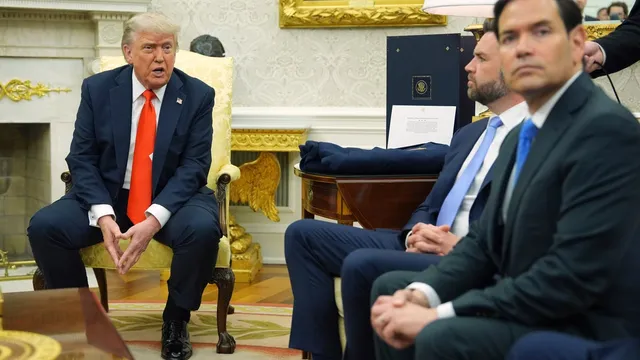
JD Vance dominates 2028 Republican primary race with huge lead
2025-06-28 14:06- An Emerson College poll indicates that Vice President JD Vance has surged to lead the Republican primary with 46% support.
- Marco Rubio ranks second with only 12%, followed by Ron DeSantis at 9% and Robert F. Kennedy Jr. at 5%.
- Vance's leading position suggests he may be viewed by Republican voters as a natural successor to Trump's political legacy.
Express your sentiment!
Insights
In June 2025, an Emerson College poll revealed that Vice President JD Vance is far ahead of his competitors in the race for the 2028 Republican presidential nomination. Holding 46 percent of the vote among GOP primary voters, Vance's commanding lead is a significant increase from his 30 percent support earlier. His closest rival, Marco Rubio, only managed 12 percent, indicating a stark difference in voter backing. Other candidates such as Florida Governor Ron DeSantis received 9 percent, while Health and Human Services Secretary Robert F. Kennedy Jr. secured 5 percent despite being an Independent. The poll, which surveyed 1,000 registered voters with a specific focus on 416 Republican primary voters, demonstrates Vance's growing popularity. Though undecided voters comprised 17 percent, Vance's rise in support can be interpreted as an indication of the Republican base's leaning towards a successor who embodies Trump's style of governance that mixes nationalism with populism. In contrast, Rubio’s comparatively lower support, despite his long political tenure, highlights the effects of Vance's visibility and current role in the Trump administration. Political dynamics further complicate the scenario, as Trump himself has remained non-committal in indicating a favored successor. During a recent interview, Trump, who has flippantly discussed an unconstitutional third term candidacy, mentioned both Vance and Rubio without showing any preferential bias. Even though he previously seemed to emphasize Rubio over Vance, the overall perception is that Vance is currently better positioned in the race, perhaps due to his substantial performance in recent polls. The implications of these findings are extensive, as Vance's leadership raises questions about the future of the Republican Party. As more candidates begin to emerge or potentially falter, political allies and analysts continue to dissect the evolving landscape, hinting that while Vance is leading now, the unpredictability characteristic of Trump-era politics could lead to rapid changes in support and ranking as the primary next draws closer.
Contexts
The impact of Donald Trump on the dynamics of the Republican Party has been profound and multifaceted. Since his rise to political prominence, Trump has reshaped the party's identity, shifting its focus towards populist themes and issues that resonate with a broad base of voters. This transformation has created an environment where traditional Republican ideologies, such as fiscal conservatism and a strong international presence, have been challenged and often overshadowed by Trump's more nationalistic and protectionist stances. His approach has attracted a diverse coalition of supporters, including those who previously felt alienated by the political establishment. This has led to a notable increase in voter engagement among non-traditional Republican demographics, significantly altering the party's composition and electoral strategies. Trump's influence extends beyond mere electoral politics; it has invigorated an aggressive style of communication, particularly through social media, that has redefined the channels of political discourse. His direct and often confrontational manner resonates with many supporters who appreciate a departure from the political norms of the past. This has encouraged other Republican figures to adopt similar communication strategies, leading to a shift in how party members engage with both their supporters and opponents. As a result, this new approach has entrenched a sense of loyalty to Trump among many in the party, creating a loyalty dynamic that sometimes overshadows the party's broader policy goals and electoral unity. Additionally, Trump’s tenure has led to significant changes in the party’s alliances and policies, fostering relationships with unconventional political figures and movements that would have been unthinkable in previous Republican administrations. His embrace of insurrectionist rhetoric and the nurturing of factions willing to challenge the status quo have introduced a factionalism within the party that can both energize and fragment it simultaneously. The emphasis on loyalty to Trump and the criticism of dissenting voices, even within the party, has raised concerns about a potential long-term fragmentation of the Republican coalition, especially as emerging leaders emerge and assess their alignment with Trump’s vision. Looking ahead, the continued impact of Trump on Republican Party dynamics is likely to evolve, particularly as the party navigates challenges in national elections and internal cohesion. The lingering influence of Trump on the political landscape suggests that the Republican Party will weigh its strategies toward maintaining enthusiasm among the base fostered during his presidency while also addressing the divergences that have surfaced since then. Ultimately, the legacy of Trump's impact will depend on how the Republican Party reconciles its traditional values with the new populist currents he has introduced, as it seeks to position itself effectively for the future in an increasingly polarized political environment.